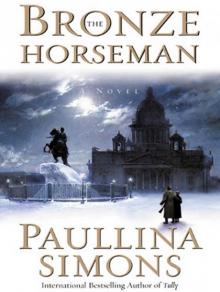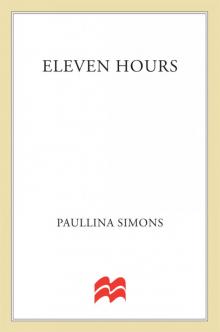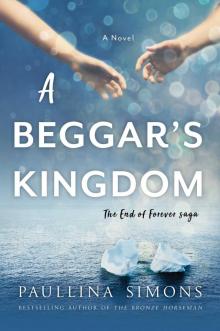- Home
- Paullina Simons
The Tiger Catcher Page 21
The Tiger Catcher Read online
Page 21
Julian scoffed.
“Yes, deride—it’s the refuge of skeptics. Do you want to know what your greatest delusion is?”
“Even if I say no, I fear you’ll tell me.”
“You have two,” Devi said. “One is you think the things that are out of your control are in your control. That’s your hubris, your irrevocable pride talking. To think you can control whether another human being lives or dies. It’s the most difficult lesson for us to learn.” Devi looked into the palms of his hands.
Julian didn’t want to hear it.
“And two—you have limited your access to her by perceiving her only as mortal.”
Julian blinked.
“It’s true, her body is mortal,” Devi said. “But her soul is not.”
Julian said nothing.
“You do believe she has a soul, don’t you? Or do you think this is all there is?”
“I don’t know,” Julian said. “And what does it matter?”
“Your cynicism is alarming,” Devi said, “but fortunately, your delusions are temporary. You still have a chance to discover your own irreducible immortality. I don’t know about her. Do you have something of hers with you? A relic that belonged to her? I’ll be able to tell you better then.”
“I don’t usually carry her things with me.” Julian put a hand on his heart where she lived. “What’s the point,” he said. “She’s gone, and I’m eternally damned.”
“How can a soul made in God’s image be eternally damned?” Devi exclaimed. He stretched out his arms, cracked his spine, twisted his neck. “This is what number 153 represents. The lie of your premise. Erase it from your thoughts. John 21. You are not the fish that got away. And neither is she.” Devi was firm. “No one is beyond salvation.”
“What have I told you?”
“You told me she led you into her aura in the mountains,” Devi said. “She held a crystal in her hands and you both vanished. She showed you a timeless realm.”
“It wasn’t a realm, it was a reflection.”
“Call it what you will. Did you feel in this reflection or did you not? Do you have the crystal with you?”
“What’s it to you?” Julian was exhausted and hostile. Now Devi wanted her stone, too?
Devi tilted his head, observing Julian’s twitching body. “When you’re not on Klonopin, do you stop dreaming of her?”
“Yes.” He didn’t like this man’s questions. They were starting to remind him of the shrink’s. “Look, I have to get back to work.” Julian only imagined getting up. “My boss hates me as it is.” He struggled to his feet, feeling faint.
“Because you keep vanishing?” Devi said. “Who wouldn’t hate you for that? But you don’t need a shrink.” The man paused as if ambivalent about continuing. “You need a shaman. Sit down.”
Julian sat down.
Rising to his feet, Devi approached Julian. “First, you must let go of your anguish,” he said. “You’re not a murderer. You’re not the man who killed her.”
But he was. He was.
“A killer burns with a terror in his sleep,” Devi said. “That’s not you.”
The shaman was wrong. It was him. Julian would never forgive himself for abandoning her in her last hours. He pressured her before she could defuse the ticking bomb that was her life. His last words to her was that he never wanted to see her again. He told her he hated her. His last act was to shove her away. There was no forgiveness for that. There was no redemption. He couldn’t look at Devi for fear he would cry in front of a stranger.
Devi almost reached out to comfort him, Julian must have looked so demolished. “It wasn’t her time,” Julian said, barely audible. “She was only twenty-eight.”
“It was her time,” Devi said. “People have the gift of death, as well as the gift of birth. She wasn’t punished. The punishment you talk about, that’s man’s unforgiveness. Man’s merciless nature, not God’s.”
Julian shook his head in disagreement.
“Did you love her?” Devi asked. “Answer me. What did that feel like inside you? It felt like light, didn’t it? Not darkness. Where does your love for her spring from, if not from a divine source?”
“So what?”
“Just think,” Devi said, “why would He who made you and made her, who gave your heart the capacity to love and your soul the capacity to change run through you with hell-fire?”
Julian collapsed inward.
“You are not made only to suffer,” Devi said gently but firmly. “You are made for other things.”
“Like what?” A downtrodden Julian waited. “Is there a single thing you can say to actually help me?”
“That depends. Can you give up Klonopin?”
“No.”
The man said nothing.
Julian peeked outside. With shock he saw it was dark. He jumped up. “How did it get so late? Ashton is going to report me missing.” He fixed the little man with a suspicious stare.
The man stared back, stern and mute. He adjusted his black sleeves, rebuttoned them, brushed off the dust from his sleeves. “I may be able to help you,” Devi said. “I don’t know. Bring me her things, whatever you have of hers, and then I’ll tell you. But—and it’s a big but—there is one non-negotiable condition.”
Warily Julian braced himself for what it could possibly be.
“You can never take Klonopin again.”
Julian blanched. “I told you, I can’t do that.”
The man slid open the noisy curtain. “Suit yourself. Then I can’t help you.”
“You don’t understand. I need it to function.” Julian was plaintive, like a child begging.
“It isn’t true. The opposite is true. The Peckham man was right. You can function. You just don’t want to. Not only is the drug not the solution, it’s its own problem. You take a pill so you can dream of her? How does that help you? How does that help her?”
Julian was reeling. How could anything help her now?
“I’m telling you how it is,” Devi went on. “You don’t want to hear it, I see that. But if you stick with me, you’re going to hear a lot of difficult things. This is one of the easiest.”
In vain Julian searched the back room for his discarded shirt.
“Klonopin is a life-threatening drug,” the man said. “Gradually you will lose your mind—what’s left of it. Klonopin, like Ativan, like Fentanyl, like Propofol, like opium”—Devi paused for a breath—“separates you from life.”
Julian thought her death had done that.
“Is it effective?” Devi continued. “For a time. Then you stop eating. Then you stop breathing. Then you stop wanting to eat, wanting to breathe. And then you die. There’s a reason that during war morphine is given only to the hopeless.”
“Klonopin is not morphine.”
“Eventually it’s meant to kill you.”
“It takes away my pain.”
“Oh, sure,” the man said almost cheerfully. “The same way death takes away your pain. Because it takes away your life.”
Julian didn’t agree. But he listened.
“What you still don’t know,” Devi said, “is that your suffering is not meant to destroy you. It’s meant to show you a way out. And Klonopin is a trap door over your conscious self. There is no way out.”
Julian knew this to be true.
“The trick is not to take Klonopin so you can see her. The trick,” Devi said, “is to see her without it.”
“I can’t see her without it,” said Julian.
“Stick with me, doubting Thomas. I will show you how.”
Julian shook his head. “I’ve tried. I can’t.”
The Vietnamese man was unimpressed by Julian’s low tone, by his defeated demeanor. “You have not tried,” he said coldly. “You have done nothing. You know the drug is there, like crutches in the closet.”
“No,” Julian repeated stubbornly.
One blink and the man held Julian’s shirt and jacket in his hands. Another blink
and Julian was being ushered out.
“Go home,” Devi said. “If you don’t come back, I’ll know you’ve found someone else to give you what you think you need.”
“You think you can give me what I need?”
The man’s face did not change its school-principal expression. “Do you yourself even know what that is?” He shook his head. “If you want meaningful communication with the dead, you cannot do it while unconscious. Have you considered that maybe she never reaches your table in the dream because you stop her with your opiate wall?”
Julian had not considered this.
Unceremoniously, Devi shoved him out into the street. “Julian Cruz, what if I told you there was a way you could see her again?” he said. “In this world, not the next, and not in your dreams, but in real life. Would you stop taking Klonopin then?” Before Julian could take a questioning breath, Devi shut and locked the door.
27
Red Beret, Take Two
WAS DEVI PRAK A SNAKE-OIL SALESMAN OR A WIZARD?
Was he inventing tricks to fool a desperate man? And frankly, how hard was that? Before the bell sounds, you’re already down for the count, while the other fighter has fled the ring clutching the victory belt.
It was after eleven when Julian banged on the door of Ashton’s suite at the Covent Garden Hotel on Monmouth Street near Seven Dials.
“Where the hell have you been?” Ashton said, flinging open the door as if he’d been on alert for hours. “I was about to call the police.”
Riley was asleep in the bedroom, so they went up the road to Freud Bar in a concrete basement.
Even if Devi was the great deceiver, what other options did Julian have? Admit himself into Weaver’s sanatorium? Bathe in mud as Riley had suggested, get his grief stung out of him by bees? Join a bereavement group? Dive into online dating as Ashton kept advising?
“I hear you didn’t come to work again today,” Ashton said. “By all means, Jules, make my job harder.”
“I was hungover,” Julian said. “That’s your fault. Too much celebrating. I took a day off, is that not allowed anymore?”
“How many days off is that since January, thirty? And why are you twitching? Is that DTs or something?”
“Course not,” said Julian.
“So what the hell is wrong with your hands? You look like you have Parkinson’s, dude. Or you’re on crack.”
Through sheer will, Julian forced his body into a pillar-like posture. He didn’t want to upset Ashton with the reality of his addiction. His friend had had entirely too much of that in his life. “What do you know about the Hmong shamans, Ash?”
“The who?”
“The Hmong. A mountain tribe from Vietnam.”
“Nothing.”
Julian knew how Ashton worked, so he waited, his hands knotted together. When they were on their second pint, Ashton cleared his throat. “Black Hmong?”
“What other kind is there?”
“Shut up. Many of them were converted to Christianity by the missionaries. Some conflated the New Testament with their ancient shamanic rites.”
“What sort of rites?”
“Ancestor veneration. Healing rituals. They burn a lot of incense,” Ashton said.
“What for?”
“To ward off sickness. To summon the dead.”
“Do they do that a lot?” Julian asked carefully. “Um, summon the dead?”
“Why? Are you thinking of going to a shaman? Sometimes they summon the dead with the help of newborns, I believe. But you can only do that if you’re one of the strongest Hmong.”
“What makes someone a shaman? I mean, how can you tell if someone is a real shaman or—a fake one?”
“Well, I suppose you know because a real one would either heal the sick or summon the dead,” Ashton said. “I mean, that’d be the first fucking clue, don’t you think? His results.”
Too invested to be baited, Julian downed his beer, leaving his hands on the glass to steady them. “Riley burns incense. That doesn’t make her a shaman.”
“Yes, because Riley,” said Ashton, “is not from mystical mountains nor does she act as an intermediary between the spirit and the material world during soul-calling rituals. Go to the library, dude. Or check out this thing on your computer, it’s pretty neat. It’s called, wait, the name will come to me—the internet!”
Stifled and trite, Julian was ground down and at the same time floating a mile above Londontown. Was Devi a shyster, a trickster, a liar?
Or was he the real thing?
“This soul-calling, it’s not devil worship, is it?” Julian asked super casually. “Like to ward off sickness, or, you know, for the other thing, you don’t have to sell your soul, do you?”
“I don’t think so. But sure, the soul can definitely be hijacked by an evil force. Look at Johnny Blaze. Why the sudden interest in the Hmong?” Ashton asked. “You think the hill men from ‘Nam can fix you? They might have the power over numbers and cards. But trust me, not in your favor, bro. I’ve seen it time and again in Vegas. While you’re at the fights, I’m at the tables. Never sit at a Hmong table. They’ll pick you clean. They don’t bust, and they always have an Ace in the hole. Is that what you wanted to know?”
Julian didn’t know what he wanted.
They continued drinking, sitting at the bar side by side, listening to Counting Crows “Daylight Fading,” watching rugby highlights on mute.
Usually he stayed with Ashton and Riley when they visited. But tonight Julian begged off. He said he wasn’t feeling well. Which wasn’t a lie; look how his hands were shaking.
Julian barely closed his eyes that long and rainy Friday night. Early Saturday morning, still in Friday’s clothes, he was on the train to Hoxton, carrying her things. The red beret. Her crystal quartz necklace, now wanted on two continents. The playbill she had signed for him at The Invention of Love. The two books by her bedside: A Chronicle of a Death Foretold (how Julian wished he hadn’t read it. He couldn’t get the image of the mother trying to break down the door to get to her son being murdered on the other side out of his head); and Monologues for Actors, the book she had bought when they first met. Ava McKenzie had taken everything else.
The door to Quatrang was locked. The sign said closed. Devi was busy with someone else. Through the mirrored glass windows that made it difficult to peek inside, Julian spied another man, a burly hirsute bear, folded into thirds at Devi’s counter.
Did Devi serve his customers one at a time? How could he possibly stay in business? Julian banged on the door until it opened, barely.
“You are obnoxiously loud and now is not a good time,” Devi said through the crack.
“I was thinking about what you said.”
“Still not a good time, despite you trying to lure me into conversation.”
“I agree to your terms,” Julian said. “Whatever you want. I won’t take it again. Klono. Ever. Just . . . help me.”
“I have to go. I’m busy.”
“Please help me.” Julian tried to get a foot inside the door, but Devi wouldn’t let him. His strength belied his size. He could knock out twenty Julians with a flick of a finger.
“Now is not a good time,” Devi repeated. “Though it’s true—you have almost no time left.” He sighed. “Do you have her things?”
“Yes.” Why did Julian feel such relief? He took them out of his pocket one by one.
“Whoa,” Devi said when his hands touched the beret. Their eyes met. “The spirit of your life is on fire in this thing.”
“You mean her life,” Julian said.
Devi’s eyes didn’t leave Julian’s face.
“She died in it. Her blood is on it.”
“I feel it. I feel a lot.” Devi nodded. “Come back Monday. I’ll talk to you then.” He moved to close the door.
Julian stopped him. He didn’t want to go. He wanted to stay in Devi’s stern, soothing presence. “Wait . . . her things . . . you’re only going to borrow them, right?�
��
“As opposed to what? Selling them on eBay?”
“I don’t know why you do anything you do. Maybe for some weird voodoo.”
“Mr. Cruz,” Devi said. “I’m a Hmong man. I come from North Vietnam, South Burma, from an ancient civilization of shamans. I told you this. I am many things. But one thing I’m not is a Creole Haitian black man. You’re confusing your mystical rituals and your dark-skinned foreigners, which is understandable, given your ignorance on a wealth of subjects, this in particular.”
“Your voodoo needles confused me,” Julian said.
“Come back Monday.”
“Wait, what did you mean when you said I could be with her again? Like in a séance?”
“Monday, Julian.”
“Wait! Why not Sunday?”
Devi spoke slow. “Because it’s Sunday.” He slammed the door.
28
When We Were Kings
JULIAN SPENT A RAINY SATURDAY HANGING WITH HIS brothers and Ashton, while Zakiyyah, Riley and Gwen shopped at Harrods. At night the seven of them met up for dinner at the Savoy Grill and saw Noel Coward’s Blithe Spirit at the Savoy Theatre. Time is the reef upon which all our frail mystic ships are wrecked. On Sunday, they got together for brunch at the Bar Brasserie in the lobby of the Covent Garden Hotel.
Ashton pored over the Sunday paper for apartments to rent and carried on a running argument with Julian over Notting Hill that sounded like a stand-up routine. It amused the girls, and perhaps that was the point.
Ashton: “Why do you say Notting Hill is too far from work?”
Julian: “It’s a geographical fact. Plus it’s too expensive.”
Ashton: “What else do you have to spend your money on? Notting Hill is young, eclectic, the girls come in all shapes and sizes, and to the one they love themselves a Yankee wid”—he stopped himself—“bachelor.”
Julian: “How do you know this?”
“Yes, Ashton,” said Riley. “How would you know this?”
“Yes, Ashton,” said Zakiyyah, and for the first time Julian saw Zakiyyah’s genuine smile. Her teasing face lit up. “How would you know this?” Aha, Julian thought. Okay, so a little bit like a beauty queen.

 The Summer Garden
The Summer Garden Six Days in Leningrad
Six Days in Leningrad Bellagrand
Bellagrand Tatiana and Alexander
Tatiana and Alexander Road to Paradise
Road to Paradise The Bronze Horseman
The Bronze Horseman Eleven Hours
Eleven Hours Tatiana's Table: Tatiana and Alexander's Life of Food and Love
Tatiana's Table: Tatiana and Alexander's Life of Food and Love The Girl in Times Square
The Girl in Times Square The Tiger Catcher
The Tiger Catcher Lone Star
Lone Star Children of Liberty
Children of Liberty A Beggar's Kingdom
A Beggar's Kingdom Inexpressible Island
Inexpressible Island Tatiana and Alexander: A Novel
Tatiana and Alexander: A Novel Tatiana's Table
Tatiana's Table A Song in the Daylight (2009)
A Song in the Daylight (2009)